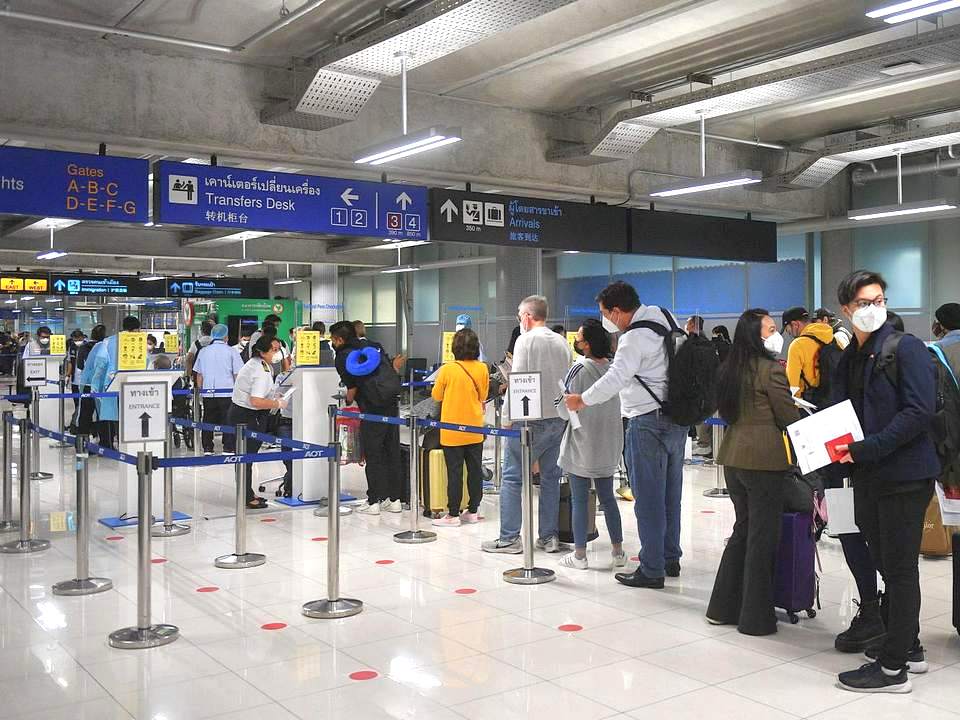
Entry Travel Authorization (ETA)
This will apply to the tourists from 93 countries currently taking advantage of the visa exempt, no-charge category: 60 days on entry plus, if needed, a further 30 days extension at local immigration for a fee of 1,900 baht (US$55). Currently, the only registration procedure is the post-arrival form TM30 submitted to local immigration by the hotel, condo owner, house master or tourist in person. Enforcement of TM 30 is selective and is a paper-driven bureaucracy.
The new ETA will require a pre-flight or pre-entry submission by e-portal, but the Thai Cabinet has yet to endorse fully the details. If the Cambodian equivalent is any clue, these tourists will need to upload the ID page of their passport and provide details of the proposed Thai address, proof of entry and exit tickets and a phone number. A key advantage of the new system, according to the Ministry of Foreign Affairs, will be possible use of electronic gates at Thai airports by using the ETA’s QR code thus bypassing an immigration counter. ETA is free but requires a new submission on every entry. The latest starting date for most tourists is June 2025, but that is still provisional.
Tourist fee of 300 baht
In spite of many announcements, the fee for stepping onto Thai soil (Kha Yeap Pan Din) has not yet been introduced. The 300 baht (US$8) fee would pay for limited insurance for short-stay tourists – mostly compensation for death or serious injury – and provide funds for improving tourist sites, e.g. installing or upgrading toilets. Some versions of the proposal reduce the fee to 150 baht if entering by land or sea, but a common charge is thought more likely. The delay in implementation is the difficulty of collecting the fee and deciding who is or is not a “tourist”. The most likely outcome later this year will be a pre-entry electronic payment linked to Krungthai Bank. Another possibility is linking payment to the “free” ETA. Critics say the whole fee exercise isn’t worth the effort and will lead to unnecessary confusion.
Destination Thailand Visa (DTV)
This five-year validity “Activity” visa was the brainchild of the Ministry of Foreign Affairs, inaugurated in July 2024. More than 70,000 have been issued in many dozens of Thai embassies abroad. The ambiguity arises because the actual admission of visitors, together with extensions, is the responsibility of the immigration bureau which is part of the Ministry of the Interior which has never uttered a single word about DTV. Immigration officers individually have the right to challenge or refuse entry or extension irrespective of the visa category. The prime minister Paetongtarn Shinawatra is known to be a firm supporter of DTV. Any significant changes to DTV policy is most unlikely to affect existing visa holders. The rest is guesswork at present. There will be feedback from late January onwards as early-bird DTV holders request extensions at local immigration.
Annually renewable retirement and marriage
The “O” non-immigrant retirement visa and annual extension of stay is by far the most popular long-stay permit for those over 50 years. A former top police general Surachate “Big Joke” Hakparn promised to reform the process by ending the scam practice of applicants using third party funds to maintain a bank account minimum, but nothing has been heard of late. Nor has there been any rumored change in the situation whereby the retiree OA visa (awarded at embassies abroad) requires ongoing medical insurance, whereas the O version (awarded at immigration offices in Thailand) does not.
The “O” non-immigrant marriage visa for a longstay foreigner with a Thai spouse is used mainly by married men under 50. This is likely because the retirement alternative is available from that age and has a less onerous application and extension bureaucracy. An early change may be the admission of same sex marriages, available from late January 2025, into the visa system. However, the government has said that while the marriage ceremony becomes a legal entity very soon, there may be a delay before the regulations covering adoption, pensions and hospital care in terminal cases come into play.
Elite and Long Term Residence
Elite or Privilege visa lasts from 5-20 years with limitless multiple entries, if needed, and has perks such as fast-track immigration and discounts on shopping, sports and hotels. It has had a checkered history and has been threatened with closure on a couple of occasions. Until the end of 2024, the initial checking fee of 50,000 baht (US$1,500) had been temporarily cancelled. A new five year Bronze Elite visa is available until June 2025 at a knock-down cost of 650,000 baht (US$20,000). The majority of new subscribers to Elite are Chinese citizens according to the Ministry of Tourism and, with a grand total of over 40,000 customers, the future in 2025 looks safe enough.
LTR is a ten year multiple entry which has several application routes including wealthy retirees (minimum annual income US$80,000) and business people and executives. The visa is sponsored by the Board of Investment. One of the attractions of LTV is apparent exemption from income tax due on overseas transfers of cash to Thailand. People in business can receive tax incentives whilst freedom from regular address reporting to immigration is a perk. No statistics have been issued as regards LTR applications, but an early report stated that the majority of successful applications were from the retirement category.
Tax identification number (TIN)
There has been ongoing speculation in social media that, starting in 2025, renewal of longterm visas will require holders to show that they have a TIN issued by the Thai Revenue Department. This is a very unlikely scenario. Many “tax resident” foreigners in Thailand for six months or more in a calendar year have no requirement to obtain a tax number based on remittances from overseas. They include foreigners who did not transfer any overseas cash in the calendar year 2024, or those who are (or will be) transferring savings in foreign bank accounts held there before on December 31 2023. Many Elite holders live in Thailand for far less than 180 days in a year but enjoy the travel flexibility given by the visa. For these and many other reasons, Thai immigration cannot equate visa eligibility with tax status. Nor will officers want to get involved.










